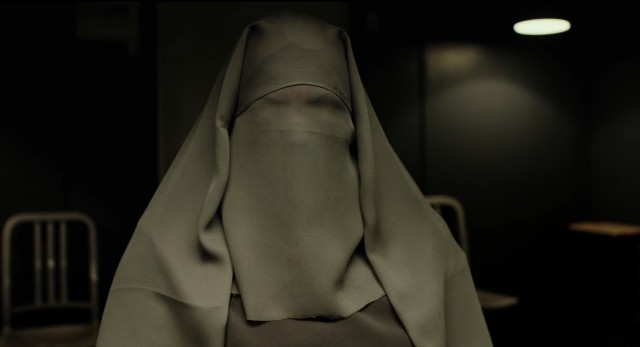Set almost entirely within a police interrogation room, Hamy Ramezan and Rungano Nyoni’s powerful short Kuuntele (Listen) proves you don’t have to get graphic to paint a terrifying portrait of spousal abuse. Inviting it’s viewers to eavesdrop on a conversation between a wife looking for protection from her violent husband, two interviewing police officers and a translator, this is a deceptively simple short that shows the same conversation from multiple points-of-view.
Replaying the scene from different perspectives invites its audience to see Listen as much more than a straightforward A-to-B narrative. What at first plays out like a disturbing tale of domestic abuse, soon evolves into something more as it tackles themes surrounding religion and immigration. As we switch perspectives from the wife to the interpreter and then to the police officers, we see how dangerous miscommunication can be, as the abused wife becomes more frantic, the translator tries to fix the problem herself and the police start to get irritated as the situation gets out of hand.
For a film so focused on communication, it seems ironic that this was also one of the biggest challenges for Ramezan and Rungano in their production, as they explain in this director’s statement:
“We directed a cast and crew whose first languages were Danish and Arabic, which both of us don’t speak, so we had our own experience of miscommunication, at least at the beginning. After a dodgy first day, we learnt how to communicate, sometimes without even speaking the same language. Lots of big gestures and focus and we understood each other’s needs – it was fascinating”.

Zeinab Rahal as the Mother character in Listen.
Though set in a very specific situation, Listen has universal appeal by tapping into that fear of what would happen if you desperately needed help, but didn’t know how to get it. For the mother in the film, the barrier stopping her escape this horrific situation is language, for others it could be money, opportunity, or alternative options. All she wants is to avoid harm, for herself and her son, yet her attempts prove futile and Ramezan and Rungano make sure we feel her fear and her frustration consistently throughout their short. Even when the perspective switches, it’s the situation of the wife you are constantly focused on and the empathy you feel for her character is almost too much to bear.
It’s rare you come across a short that feels as if it demands an instant second viewing, but Listen is a strong exception. Rewatching Ramezan and Nyoni’s 13-minute film, I was struck by how powerful it still was the second time around. Even with the knowledge of how the narrative would play out, I still found myself gripped by the dialogue and completely invested in the situation. With Listen ending in a very open manner, as a viewer that’s both troubling and rewarding in equal measures. As an empathetic audience member, you obviously want to know how the story concludes and that our protagonist is safe and protected, but also by leaving the ending ambiguous, it leaves plenty of room for audience interpretation. What will happen next will very much depend on your imagination/experiences.
Listen had a strong festival run in 2015, winning awards at Aspen, Cork, TIFF, Upsalla and more. Since completing the short Ramezan released two feature films: a documentary called Tuntematon pakolainen and a narrative piece titled Any Day Now. While Nyoni’s debut feature I Am Not a Witch, saw the filmmaker win a BAFTA award for Outstanding Debut by a British Writer, Director or Producer.

 Rob Munday
Rob Munday